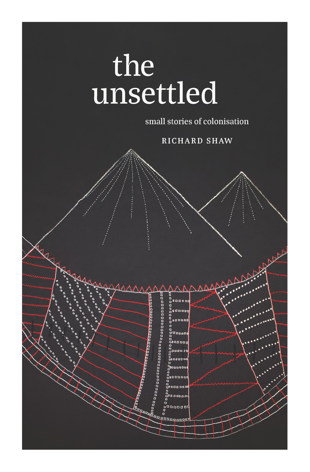Paul Diamond reviews The Unsettled: Small stories of colonisation by Richard Shaw for Aotearoa New Zealand Review of Books:
‘Richard Shaw’s 2021 memoir The Forgotten Coast was a powerful meditation on the lives of three men in his family. The death of his father Bob in 2012 prompted him to look further into his family history. Shaw researched the story of Dick Gilhooly, a maternal great uncle, who left Pungarehu in South Taranaki to study for the priesthood in Mosgiel and then Rome. Bob and Dick’s stories were overshadowed by what Shaw discovered about his great grandfather, Andrew Gilhooly. Andrew arrived in Aotearoa in 1875 from County Limerick in southwest Ireland. He joined the Armed Constabulary and in 1881 was among the troops at te pāhua, the invasion of Parihaka, the Māori village in south Taranaki. Later, Andrew and his wife Kate purchased three farms on land confiscated from Māori. As Shaw writes, ‘what was a beginning for them was an ending for others’.
It is an understatement for Shaw to write that Andrew Gilhooly’s story ‘got people going’. Following the publication of The Forgotten Coast and an essay on the Conversation website, Shaw received sustained feedback – from detractors, but also many people who had been similarly disturbed by aspects of their families’ histories in Aotearoa. These ‘small stories of colonisation’ from across the country, make up The Unsettled. Some contributors have agreed to their first names being used; others are quoted but unnamed. It is a credit to Shaw that he manages to pull these testimonies together in a coherent form. His own story does dominate, but the ‘shared threads’ of these other origin stories reinforce his argument about how history resonates in the present.
The ‘unsettled’ of the title refers not only to the unease felt by Shaw and his collaborators, but also to an awareness of ‘the unsettling effects the arrival of their settler families in this land have had on those who were here before’. The people whose voices Shaw presents, ‘reject the lazy tropes about the civilising effects of colonisation’ and want to change the conversation about the past and its impact on the future. This is not about judging or blaming antecedents, who need to be seen in their own context, but acknowledging the impact of their actions.’
Read the full review here.


